Foods that Clog Your Arteries
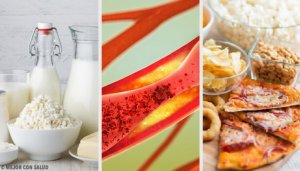
There are some foods that clog your arteries when you eat them in excess and constantly. Although you can develop arterial blockages for several reasons, your diet plays an important role. Want to know more? In this article, we tell you all about it.
Why do arteries get clogged?
When our arteries become clogged, we have developed a condition called atherosclerosis. According to an article published in the National Heart, Lung, and Blood Institute, it’s a health problem that specifically develops in the blood vessels.
There are different risk factors that increase the possibility of suffering cardiac problems as a result of clogged arteries. For example, hypertension, high cholesterol, and obesity.
However, there are also other causes related to our habits:
- Smoking
- Drinking alcohol
- Not exercising
- Eating foods with high-fat content
Little by little, the fat (or plaque) accumulates in the walls of our arteries, narrowing them and causing them to stiffen. When this happens, our blood cannot flow like it normally does.
In many cases, the clogged arteries do not show any symptoms (similar to what happens with cholesterol). Unfortunately, we usually don’t realize there’s a problem until it causes a heart attack.
That’s why it’s very important to follow a balanced diet that’s rich in raw fruits and vegetables to avoid processed foods and to do physical activity.
Which foods clog our arteries?
Diet is key for overall wellbeing. For that reason, specialists recommend we maintain a healthy diet that provides what we need.
According to an investigation published in the Journal of Pharmacology and Experimental Therapeutics, there are some foods, like those of animal origin, that could general arterial obstructions. Foods like vegetables, on the other hand, are beneficial.
So, what foods clog the arteries? To look after your health, even if you’re suffering some illness it’s very important that you are conscious of the dangers. Below, we go into a bit more detail about these foods.
You may also be interested in: Fat Burning Smoothies that will Fascinate You
Meat
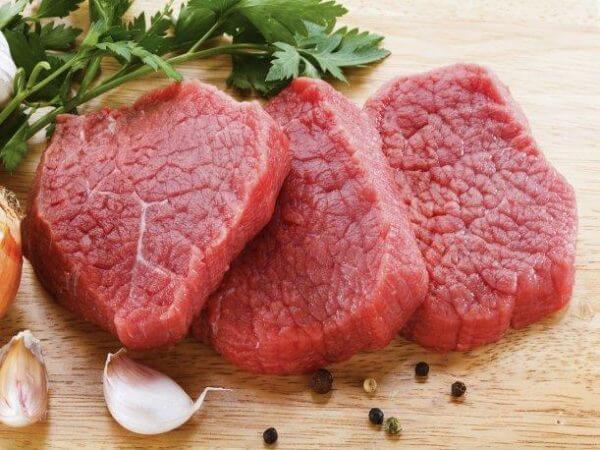
Meat is a basic food that provides important levels of protein, iron, zinc, and other nutrients. However, in excess, it can drive cholesterol levels up, especially red meat.
However, as investigations show, processed meats like sausages, hot dogs and bacon, for example, not only contain high levels of saturated fats but also added salt.
- Eating these products more than twice a week contributes to the development of cardiac diseases.
Poultry skin
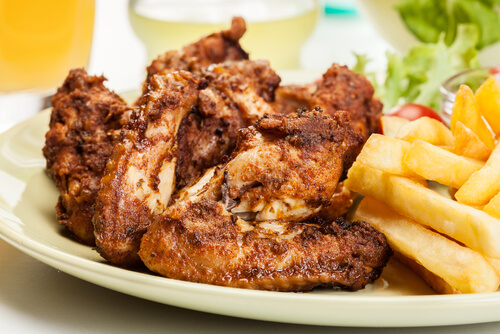
An investigation published in Food and Nutrition Research supports consuming poultry as a way to improve the quality of your diet. However, you should consume the leaner sections, like the breast.
Those accustomed to eating chicken or turkey skin, especially if it’s fried, are at a higher risk of atherosclerosis. Although there is no evidence to support this fact, there are studies that link fried or high-in-fat foods with cardiovascular difficulties.
Just one fried wing has 0.35 ounces of fat and 160 calories. Before cooking poultry, we recommend that you remove the skin.
Trans fats
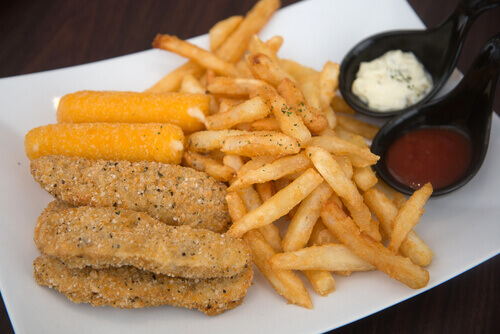
- We can mainly find them in processed foods, in margarine, in baked goods and frostings.
When you go grocery shopping, we recommend that you take a look at the labels to inform yourself about hydrogenated oils that are used for that particular product.
Want to know more? Read this: Peripheral Artery Disease: Symptoms, Causes and Treatment
Oils and salty snacks
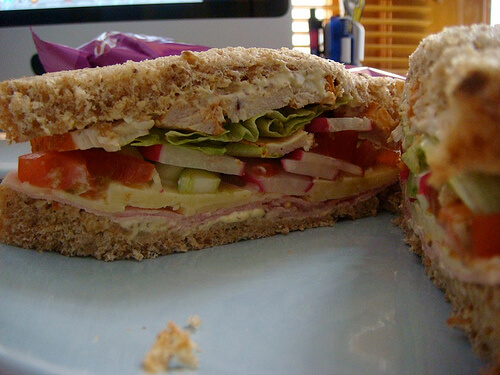
The majority of oils that are used in the kitchen (corn, sunflower, etc.) are rich in saturated fats. These don’t benefit our cardiovascular health.
Also, the typical snacks that we like to “pick at” (french fries, peanuts, etc.) are made with these types of oil. For cooking, we recommend that you use oils that contain unsaturated fats such as, olive or rapeseed.
Junk food
In this section we can mention pizza and hamburgers, but there are so many other examples. An investigation published in Health Promotion Perspectives highlights that, in addition to increasing cardovascular risks, they also cause obesity.
All of these foods have a lot of fat and cholesterol. Also, in many cases they contain chemical and artificial ingredients that make them taste better and increase their commercial performance.
Foods that clog the arteries also harm the rest of the body
Foods that clog the artieres are the same that we associate with metabolic problems like obestiy or diabetes. It’s important to always be mindful when consuming them and try to opt for healthy and fresh foods.
If you have any doubts about this topic, consult a nutritionist. The porfessional will be able to indicate which foods you should include in diet plan that is suitable for you, according to your needs and objectives.
All cited sources were thoroughly reviewed by our team to ensure their quality, reliability, currency, and validity. The bibliography of this article was considered reliable and of academic or scientific accuracy.
- Cynthia A Daley et al. “A review of fatty acid profiles and antioxidant content in grass-fed and grain-fed beef”, Nutr J. 2010; 9: 10.
- Ronan Lordan et al., “Dairy Fats and Cardiovascular Disease: Do We Really Need to Be Concerned?”, Foods. 2018 Mar; 7(3): 29.
- Taraka V. Gadiraju et al. “Fried Food Consumption and Cardiovascular Health: A Review of Current Evidence”, Nutrients. 2015 Oct; 7(10): 8424–8430.
- Leah E Cahill et al. “Fried-food consumption and risk of type 2 diabetes and coronary artery disease: a prospective study in 2 cohorts of US women and men“, Am J Clin Nutr. 2014 Aug; 100(2): 667–675.
- Gebauer SK et al. “Vaccenic acid and trans fatty acid isomers from partially hydrogenated oil both adversely affect LDL cholesterol: a double-blind, randomized controlled trial”, Am J Clin Nutr. 2015 Dec;102(6):1339-46.
This text is provided for informational purposes only and does not replace consultation with a professional. If in doubt, consult your specialist.








